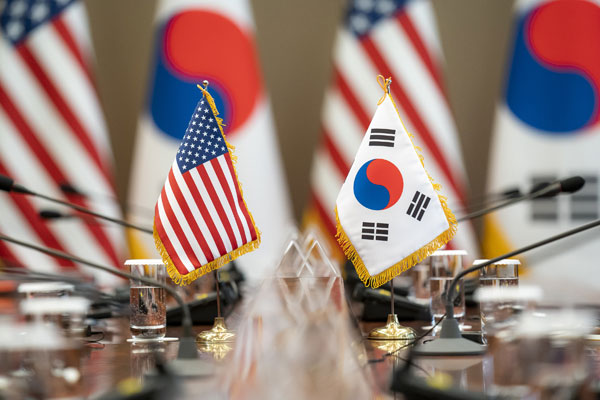South Korea and the United States signs 11 MOUs and contracts on five essential manufacturing industries

[Bilateral meeting at Blue House in Seoul, South Korea. Credit to Rawpixel]
On Aug 25, 2025, the “Korean-American Business Roundtable: A Manufacturing Renaissance Partnership” was convened at the Willard Hotel of Washington D.C, addressing multiple MOUs and contracts that will tie South Korea and United States adamant ever before in the manufacturing industry.
The conference, held during President Lee’s U.S. visit, covered 11 comprehensive contracts and MOUs across diverse manufacturing sectors, becoming the first economic cooperative move between the U.S. and South Korea after Lee’s presidential election
In contrast to the discussions held for U.S. tariff policies upon South Korea in July, the roundtable emphasized mutual dialogue.
Among the five crucial manufacturing sectors mentioned: Shipbuilding, Aerospace, Nuclear Plants, Minerals, and Natural Gases, several concluded with reciprocating investments of resource and infrastructure investment.
South Korea was represented by prominent leaders of major corporations such as Samsung, SK, Hyundai, etc and the Minister of Trade, Industry, and Energy, Kim Jeong-Kwan.
Similarly the United States delegation included Howard Lutnick, the Minister of Commerce, as well as21 private company owners including Jesen Hwang of Nvidia.
On par for continuous economic collaboration for both nations, more than 60 individuals gathered to execute memorandums and contracts that would further enhance Korea-American trade routes and logistics.
In the nuclear energy sector, Korea Hydro & Nuclear Power Co., Ltd was able to get a memorandum of crucial participation in establishing uranium enrichment facilities of Centrus.
Following that, Fermi America and Dusan Ener-bility came to a consensus in supplying Small Modular Reactors(SMR) across the “AI Campus Project” set to span over 6000 acres.
Alongside assisting in novel manufacturing plans of the U.S. for energy, Korea also concurred in advising shipbuilding infrastructures in the U.S.
HD Hyundai, Korea Development Bank, and Cerberus Capital intricately made MOUs in establishing communal funds on various American shipbuilding projects.
The 2 MOUs outlined potential cooperation in developing American shipbuilding infrastructure, renovating logistics between South Korea, U.S., and other passive nations, and introducing new maritime technologies.
Similarly, Samsung Heavy Industries and Vigor Marine Group reached an agreement on future maintenance and repair of the U.S. Navy auxiliary ships and modernizing shipbuilding within American ports.
In the LNG sector, the Korean Gas Corporation agreed with Trafigura and Cheniere, international natural gas exporters, to import 3.3 million tons of natural gas annually starting 2028.
The Korean Gas Corporation stated that “the ahead contract would mid-long termly benefit stabilizing flow of natural gases and cost fluctuations inside South Korea.”
Meanwhile, the aerospace industries finalized more direct deals.
Korean Air made deals with Boeing and GE Aerospace to integrate 103 new planes from the former and consign plane repair to the later.
Finally, mineral trades were also highlighted from a collaboration of Korean Zinc Company, Ltd and Lockheed Martin, an aerospace / military technology contractor, on Germanium purchase and supply chain sharing.
Minister Kim Jeong Kwan of the Ministry of Trade, Industry and Technology emphasized as of contracts and MOUs aforementioned to be “supported with all necessary and adequate policies to lead into a renaissance of manufacturing industry for both nations.”
Although positive collaboration appears promising, as MOUs possess a non-binding intention compared to deals or contracts, it is uncertain of how far the economic vision could subsist.
Since South Korea and the U.S. have started their new regimes from opposite parties of former governments, establishing a firm economic alliance is crucial for the sustaining of both nations.
Amid persistent tensions over tariff policies and to-be-determined actions, it is ambiguous to conclude how effective this manufacturing cooperation could be for the two nations.

- Shinho Lee / Grade 10
- Korea International School Jeju

![THE HERALD STUDENT REPORTERS [US]](/assets/images/logo_student_us.png)
![THE HERALD STUDENT REPORTERS [Canada]](/assets/images/logo_student_ca.png)
